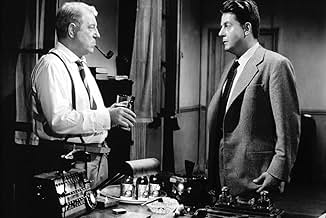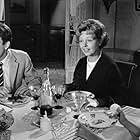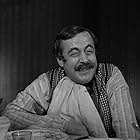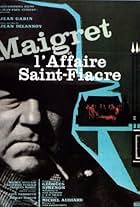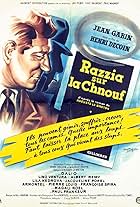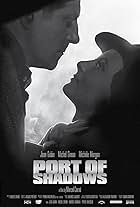IMDb RATING
7.2/10
2.1K
YOUR RATING
A serial killer is targeting women in the seedy district of Le Marais.A serial killer is targeting women in the seedy district of Le Marais.A serial killer is targeting women in the seedy district of Le Marais.
- Nominated for 3 BAFTA Awards
- 1 win & 3 nominations total
Jean Debucourt
- Camille Guimard - le directeur de la Police Judiciaire
- (as Jean Debucourt de la Comédie Française)
Jean-Louis Le Goff
- Goudier
- (as Jean-Louis Le Goff, de la Comédie Française)
Pierre-Louis
- Rougin - un journaliste
- (as Pierre Louis)
Gérard Séty
- Georges "Jojo" Vacher
- (as Gérard Sety)
Storyline
Did you know
- TriviaFrench visa # 19714 delivered on 23-1-1958.
- Quotes
Inspector Jules Maigret: Wow, there IS grey matter working under these rollers.
- ConnectionsEdited into Portrait souvenir: Georges Simenon, part 4: Maigret (1963)
Featured review
It's a hot summer in Paris while a mysterious killer is plaguing the serene joie de vivre of Montmartre district making victims out of women who have in common (besides the misfortune of being at the wrong place at the wrong moment of the night) to be young and plump brunettes. The film opens with a murder that recalls the beginning of the mother of all psychological thrillers: "M" and there's more that justifies the comparison.
Jean Delannoy's "Maigret Sets a Trap" is a fine example of a police procedural film that gets three things right: first, it perfectly conveys the atmosphere of an impending danger whose motivations -we rapidly suspect- are rooted in the mire of human psyche, secondly, the villain isn't just an antagonist but the subject of a character study that unveils the sleaziest and most sordid expressions of hubris and finally, the film lies on the broad shoulders of a great and iconic protagonist in the person of Jules Maigret, the 'French' Sherlock Holmes, created by Belgian writer George Simenon.
A few words about Maigret: the Chief Inspector is a robust-looking, well-built man with a reassuring physique and a sort of detached attitude that allows him to be more perceptive of little details surrounding him, he's a man who takes his time, follows his instinct, and tries to identify hints about the assassin's profile as insistently as if they were tangible evidence. He's a man who can nonchalantly wonders across a busy street to test the waters and gather clues from the mere sight of playful kids or noisy vendors. He's not alone in this job, he has various subordinates (one is played by Lino Venture) whose mission can consist of walking in the screen and fishing potential suspects out of shoals of onlookers.
I make his approach methodical but it isn't, Maigret built enough experience not to let himself distracted by bureaucracy, he can enter a house without a warrant considering it's up to the suspect to know the rules. He handles information as if they're no big deal, encouraging the suspect to go on without arousing any suspicion on his side, "may I see your wardrobe?" "did you have a key?" innocent questions whose purpose is to grab facts that can eventually be contradicted by subtle cross-examinations. There's something fascinating in the way Maigret handles the investigation, even when we suspect he's not fooled by the criminal's identity, let alone his psychological profile, he still acts with the potential killer as a simple civil servant concerned by red tape issues.
There's no doubt in my mind that Gabin was born to play Maigret, the actor, in the second part of his career, had the quiet strength of the experienced man, who knows when to speak, when to listen and when to let his authoritarian voice erupt in a few occasions. Gabin was perfect to play characters who didn't need to rise their voice to obtain what they wanted and knew when to use it to finally get the confession, a man in total control of the situation even when it could get out of control. Gabin trusts his competence and knows that his instinct would only half fool him and half the way to the killer goes through the fatal weakness he'll be able to spot. He can tell from an anonymous letter that there's a big ego behind the assassin, one that would bite on the right bait.
Basically, the film is composed of three acts: Maigret sets the trap that fulfills its purpose in extremis, then there's the investigation where Maigret asks questions between Montmartre and Les Rosiers and the film's climax consists of interrogation scenes that are as riveting and absorbing as the classic "Garde à Vue" by Claude Miller: Maigret in his office, Maigret outside and Maigret in the interrogation room. And at that point of the review I must mention that, in her earliest roles, Annie Girardot delivers a great subdued performance as a bourgeois woman bored by her effeminate husband Jean Desailly, equally superb as the Mama's boy who's been so pampered by her mother he developed a strong aversion to the female persuasion. Both actors would be nominated for the BAFTA Awards.
There's a great study of French manhood in that early urban setting of the 50s that might echo the post-war atmosphere film noir. France was a country that was both defeated at the end of the war and yet had its honor saved by the great De Gaulle, a country whose citizens accepted the patronizing and infantilizing tone of Pétain telling them to surrender to Germany for their own good and yet where a handful of fighters decided to maintain the fight. It's one of France's tragic ironies to have invented the world 'Resistance' and be forever associated with 'surrendering'. In that confrontation between Maigret and the suspect, there's the collision of these two sides of French manhood, the old-school and principled citizen and the wimp who accepts defeat and yet doesn't have the guts to assume it. This is why you can't totally disconnect the film from a certain view of France and the way social classes can condition ethical choices, that the killer is highly educated says a lot about a certain defiance toward the upper class man.
There's more in "Maigret" than a formulaic police movie: behind the investigation, there's a study on mores of its time, it's a rather disenchanting and heavy-loaded portrait of a moral decadence and the way men have lost their way, and when the film ends with that sudden rain, we feel as relieved as Maigret who chooses to walk alone on the street as if he felt even the police couldn't triumph over all the filth and evil that eat away the people and maybe a good rain will watch some of it.
The first opus of the "Maigret" saga is a gem of French popular cinema... with an assumed populist undertone.
Jean Delannoy's "Maigret Sets a Trap" is a fine example of a police procedural film that gets three things right: first, it perfectly conveys the atmosphere of an impending danger whose motivations -we rapidly suspect- are rooted in the mire of human psyche, secondly, the villain isn't just an antagonist but the subject of a character study that unveils the sleaziest and most sordid expressions of hubris and finally, the film lies on the broad shoulders of a great and iconic protagonist in the person of Jules Maigret, the 'French' Sherlock Holmes, created by Belgian writer George Simenon.
A few words about Maigret: the Chief Inspector is a robust-looking, well-built man with a reassuring physique and a sort of detached attitude that allows him to be more perceptive of little details surrounding him, he's a man who takes his time, follows his instinct, and tries to identify hints about the assassin's profile as insistently as if they were tangible evidence. He's a man who can nonchalantly wonders across a busy street to test the waters and gather clues from the mere sight of playful kids or noisy vendors. He's not alone in this job, he has various subordinates (one is played by Lino Venture) whose mission can consist of walking in the screen and fishing potential suspects out of shoals of onlookers.
I make his approach methodical but it isn't, Maigret built enough experience not to let himself distracted by bureaucracy, he can enter a house without a warrant considering it's up to the suspect to know the rules. He handles information as if they're no big deal, encouraging the suspect to go on without arousing any suspicion on his side, "may I see your wardrobe?" "did you have a key?" innocent questions whose purpose is to grab facts that can eventually be contradicted by subtle cross-examinations. There's something fascinating in the way Maigret handles the investigation, even when we suspect he's not fooled by the criminal's identity, let alone his psychological profile, he still acts with the potential killer as a simple civil servant concerned by red tape issues.
There's no doubt in my mind that Gabin was born to play Maigret, the actor, in the second part of his career, had the quiet strength of the experienced man, who knows when to speak, when to listen and when to let his authoritarian voice erupt in a few occasions. Gabin was perfect to play characters who didn't need to rise their voice to obtain what they wanted and knew when to use it to finally get the confession, a man in total control of the situation even when it could get out of control. Gabin trusts his competence and knows that his instinct would only half fool him and half the way to the killer goes through the fatal weakness he'll be able to spot. He can tell from an anonymous letter that there's a big ego behind the assassin, one that would bite on the right bait.
Basically, the film is composed of three acts: Maigret sets the trap that fulfills its purpose in extremis, then there's the investigation where Maigret asks questions between Montmartre and Les Rosiers and the film's climax consists of interrogation scenes that are as riveting and absorbing as the classic "Garde à Vue" by Claude Miller: Maigret in his office, Maigret outside and Maigret in the interrogation room. And at that point of the review I must mention that, in her earliest roles, Annie Girardot delivers a great subdued performance as a bourgeois woman bored by her effeminate husband Jean Desailly, equally superb as the Mama's boy who's been so pampered by her mother he developed a strong aversion to the female persuasion. Both actors would be nominated for the BAFTA Awards.
There's a great study of French manhood in that early urban setting of the 50s that might echo the post-war atmosphere film noir. France was a country that was both defeated at the end of the war and yet had its honor saved by the great De Gaulle, a country whose citizens accepted the patronizing and infantilizing tone of Pétain telling them to surrender to Germany for their own good and yet where a handful of fighters decided to maintain the fight. It's one of France's tragic ironies to have invented the world 'Resistance' and be forever associated with 'surrendering'. In that confrontation between Maigret and the suspect, there's the collision of these two sides of French manhood, the old-school and principled citizen and the wimp who accepts defeat and yet doesn't have the guts to assume it. This is why you can't totally disconnect the film from a certain view of France and the way social classes can condition ethical choices, that the killer is highly educated says a lot about a certain defiance toward the upper class man.
There's more in "Maigret" than a formulaic police movie: behind the investigation, there's a study on mores of its time, it's a rather disenchanting and heavy-loaded portrait of a moral decadence and the way men have lost their way, and when the film ends with that sudden rain, we feel as relieved as Maigret who chooses to walk alone on the street as if he felt even the police couldn't triumph over all the filth and evil that eat away the people and maybe a good rain will watch some of it.
The first opus of the "Maigret" saga is a gem of French popular cinema... with an assumed populist undertone.
- ElMaruecan82
- May 24, 2020
- Permalink
- How long is Inspector Maigret?Powered by Alexa
Details
- Release date
- Countries of origin
- Language
- Also known as
- Woman-Bait
- Filming locations
- Place-des-Vosges, Paris 4, Paris, France(place where the serial killer operates)
- Production companies
- See more company credits at IMDbPro
Box office
- Gross US & Canada
- $8,528
- Opening weekend US & Canada
- $2,556
- Oct 22, 2017
- Gross worldwide
- $8,528
- Runtime1 hour 59 minutes
- Color
Contribute to this page
Suggest an edit or add missing content



